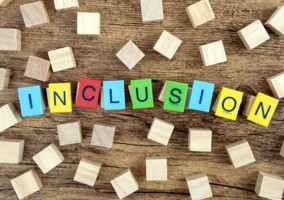It’s a fragile time for older people in the workplace. Many are choosing to leave it altogether, and employers are opting to recruit younger staff. But, as a forward-thinking charity in a county where workforce capacity is a major concern, we need to adapt to accommodate diversity in our workplace, because older people have so much to offer.
Just before the pandemic started, we got involved with the ERDF-funded Inclusivity Project, a business-oriented academic team doing research into inclusivity and funding ideas from local businesses, to accelerate our healthy workplace offer, to explore and consider how we can support, recruit and retain people as they age.
Here in Cornwall, the average age of our population is increasing faster than the rest of the UK. In fact there’s an employment gap for people aged 50+, disabled people, and people with long-term health conditions – alongside a skills shortage.
We employ 140 staff and more than 300 volunteers, with the majority of our workforce over 50. All of our teams live in Cornwall and the Isles of Scilly. Our mission to “inspire individuals and communities to age well” is as much about altruism as it is a business strategy.
Unconscious bias
We've been focusing on employment issues around older people for some time. One of the things that we've done together through this project is look at unconscious bias – the idea that products, processes and services are often designed, unintentionally, by the many and for the many. This can have serious and real negative consequences for older staff.
Unconscious bias can apply not only to age but also to gender, race, disability and more. By tackling unconscious bias we can create greater flexibility, without marginalising through the use of assumptions about individuals and what they can do. We’ve already taken big strides forward. Our recruitment team and managers took part in the research and we undertook a number of reflective practice sessions for people to talk about their understanding in a safe space. This has led to additional training for managers – specifically in the approach we use (a mix of communication methods), using lived experience much more as part of experiences and including more training for neuro-divergent conditions.
There is a growing body of evidence about the benefits of greater diversity and inclusion, ranging from better financial returns to higher levels of innovation and more engaged employees. Therefore, we've looked at some of our practices in recruitment, training and retention. We have recently included training in neuro-divergent conditions as part of our induction process and following a team consultation.
We make a huge mistake if we don’t include older people in our workforces. They are often the glue that hold our communities together and create both financial value and social capital in many different sectors. Embracing, engaging and supporting our older population to age well, keep healthy, keep working and volunteering provides a real opportunity for charities to add value to their organisations. Bear in mind, many older people provide the backbone of informal care.
Framework for hybrid working
Charities also have to get to grips with the agility and adaptability that an older population might want out of our workplace. We have implemented hybrid working – where people can work flexibly across the week, from home or in the office. This isn’t an offer we can make to every single person across all our services, some have to be run from offices or at certain times. But it is an offer we can make to the majority, to fit in with caring responsibilities, abilities, need and lifestyle.
Isolation and anxiety have definitely increased among an older population. In fact, we've all had a taste of social isolation and loneliness through Covid, whereas older people have been experiencing that for many years.
We’ve looked at what our staff and our volunteers feel about hybrid and flexible working, and have been co-designing a hybrid working culture with the researchers, looking at opportunities to overcome some of the challenges.
Throughout the pandemic, technology has put a distance between us and our teams, as video meetings tend to be much more transactional. So, staff have developed ideas around different ways of connecting with each other, and how people can have an opportunity to talk off agenda and gain support and recognition.
For example, we have set up a buddy/peer support system for people to connect around the place they live, a programme of support events, a focus on induction to make people feel connected, monthly team briefings and reflective practice sessions offering a safe space for teams to come together.
We also have lunch and learns on specific topics bringing people together across the organisation, and our healthy workplace group organises things like local works, work/balance sessions, as well as menopause and healthy living support. This is a journey for us and we are re-visiting some of the suggestions teams made in the engagement with the Inclusivity Project to see what else we might do, such as additional digital support.
We’re creating a framework for what a hybrid working environment might look like in the future and, in doing that, being much more inclusive about age, and the places that people might want to live and work.
Lots of the discussions that we've had around unconscious bias and hybrid working have been shared with other local charities as part of the Cornwall Voluntary Sector Forum.
In every part of the project, we've been able to test and develop some of those ideas as we've gone along in practice. The outcomes will influence the third sector, business and policymakers, not just in Cornwall but far beyond.
And back to our staffing figures. We’ve strengthened those numbers by recruiting more people who had taken early retirement into the organisation on flexible work patterns.
Our journey in inclusivity and diversity won’t stop with our involvement in this programme. It has offered us a catalyst for discussion with our teams and accelerated our healthy workplace strategy, but the need to future proof our charity through adaption and agility will remain.
Tracey Roose is chief executive of Age UK Cornwall and the Isles of Scilly
Other Voices
Patricia Hamzahee: Why Black philanthropy matters
Patricia Hamzahee, co-founder of GiveBLACK, writes that the organisation seeks a self-sustaining model of giving within Britain’s Black communities
Jeremy Hughes and Dr Allison Smith: Rethinking volunteering in rural areas
Jeremy Hughes and Dr Allison Smith discuss how larger charities and those in rural areas could collaborate better on volunteering
Kate Bennell: Why charities should all focus on inclusive communications
To coincide with CharityComms accessible communications guide, contributor Kate Bennell shares why charities should focus on becoming more inclusive












